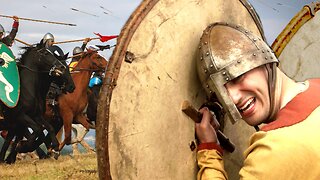Premium Only Content

Episode 1441: The Bible - Book of Kings II
Here is an overview of the main themes and events covered in the Second Book of Kings:
Succession of Kings: The book begins with the reign of Solomon, who succeeded his father, David, as king of Israel. It then covers the subsequent kings of Israel and Judah, detailing their reigns, deeds, and whether they were faithful to God or not.
Solomon's Reign: The book begins with Solomon ascending to the throne of Israel after the death of his father, King David. Solomon is known for his wisdom, wealth, and construction of the First Temple in Jerusalem, which becomes a central religious site for the Israelites.
Rehoboam and Jeroboam: After Solomon's death, his son Rehoboam becomes king, ruling over the southern kingdom of Judah, with its capital in Jerusalem. However, Jeroboam, an official in Solomon's government, leads a rebellion and becomes the king of the northern kingdom of Israel, with its capital in Shechem and later Samaria. This division of the kingdom marks a significant turning point in Israel's history.
Succession of Kings in Israel: The book details the line of kings who rule over the northern kingdom of Israel. Many of these kings are characterized as evil and unfaithful to God. Some notable kings include Omri, Ahab, and Jehu, who was responsible for eradicating the worship of the god Baal but did not completely follow God's commands.
Succession of Kings in Judah: Likewise, the book covers the succession of kings in the southern kingdom of Judah. While there are some righteous kings in Judah, such as Hezekiah and Josiah, there are also many who turn away from God and engage in idolatry. The faithfulness of these kings often determines the fortunes of the kingdom.
Prophetic Interactions: Throughout the succession of kings, various prophets, including Elijah and Elisha, interact with these rulers. They often deliver God's messages and warnings, condemning idolatry and calling for repentance. Miraculous events, such as the raising of the dead and the provision of food, occur through their ministries.
Foreign Threats: Both Israel and Judah face threats from foreign powers during this period. The book describes conflicts with the Arameans (Syrians), the Assyrians, and later the Babylonians. These foreign powers play a role in the downfall of the kingdoms.
The Fall of Israel and Judah: The book ultimately chronicles the fall of the northern kingdom of Israel to the Assyrians in 722 BC and the exile of many Israelites. It also narrates the fall of the southern kingdom of Judah to the Babylonians in 586 BC, leading to the destruction of Jerusalem and the exile of the people to Babylon.
The succession of kings in the Second Book of Kings highlights the importance of leadership, faithfulness to God, and the consequences of idolatry and disobedience. It illustrates how the choices of rulers and the spiritual condition of the people had a direct impact on the fate of the Israelite kingdoms. The narratives of the various kings, both in Israel and Judah, serve as lessons in the importance of following God's commands and maintaining a covenant relationship with Him.
Prophets and Miracles: Throughout the book, various prophets play significant roles, including Elijah and Elisha. Miraculous events, such as the raising of the dead and the multiplication of food, are attributed to these prophets.
Prophets play a significant role in the narrative, delivering messages from God, performing miracles, and confronting the rulers and people of Israel and Judah. Here's a closer look at some of the prominent prophets and their miraculous activities in the book:
Elijah:
Drought and the Ravens: Elijah was a powerful prophet who, in response to the wickedness of King Ahab and Queen Jezebel, declared a drought over the land. God miraculously provided food for him by sending ravens to bring him bread and meat.
The Widow's Oil and Son: Elijah stayed with a widow in Zarephath, and God miraculously multiplied her meager supply of flour and oil to sustain her and her son throughout the famine. He also raised the widow's son from the dead when the child became ill and died.
Mount Carmel Showdown: One of the most famous stories involving Elijah is the showdown on Mount Carmel. He challenged the prophets of Baal to a contest to see whose God would answer with fire. After the prophets of Baal failed, Elijah prayed, and God sent fire from heaven, consuming his sacrifice.
Whirlwind and Ascension: Elijah was taken up to heaven in a whirlwind, accompanied by a chariot of fire. His departure was a miraculous event witnessed by his successor, Elisha.
Elisha:
Parting of the Jordan River: Elisha performed his first miracle by striking the Jordan River with Elijah's cloak, causing it to part, allowing him to cross on dry ground.
Healing of Naaman: Elisha healed Naaman, a commander of the Syrian army, of leprosy. Naaman initially resisted Elisha's instructions but was eventually persuaded to bathe in the Jordan River seven times, which resulted in his healing.
Multiplication of Oil: Elisha helped a widow whose husband had left her with debts. He miraculously multiplied her small jar of oil, enabling her to pay off her debts and have enough to support herself and her sons.
Raising the Shunammite Woman's Son: Elisha raised the son of a Shunammite woman from the dead. This woman had shown kindness to Elisha by providing him with a room in her house, and he repaid her by performing this miracle.
Healing of the Poisoned Stew: Elisha miraculously purified a pot of poisonous stew that had been prepared for the sons of the prophets.
These are just a few of the many miraculous events associated with the prophets Elijah and Elisha in the Second Book of Kings. Their actions demonstrated the power of God and served to validate their roles as messengers of the divine. The book highlights the importance of faith, obedience, and trust in God's guidance through the examples of these prophets and their miraculous deeds.
Division of the Kingdom: The book covers the division of the united kingdom of Israel into the northern kingdom (Israel) and the southern kingdom (Judah) after Solomon's reign. This division is a central theme, and it leads to the subsequent histories of these two kingdoms.
the division of the kingdom is a pivotal event in the biblical narrative and plays a central role in the Second Book of Kings. It marks the split between the united kingdom of Israel, which was established under King Saul and developed under King David and King Solomon, into two separate kingdoms: the northern kingdom of Israel and the southern kingdom of Judah. Here's a more detailed look at the division of the kingdom:
Background:
The division of the kingdom occurred after the death of King Solomon, who was renowned for his wisdom and wealth.
Solomon's reign was marked by the construction of the First Temple in Jerusalem and the imposition of heavy taxes and labor burdens on the people to fund his building projects.
After Solomon's death, his son Rehoboam succeeded him as king. However, the people, led by Jeroboam, presented Rehoboam with grievances, demanding that the heavy burdens be lifted.
Rehoboam's Response:
Rehoboam initially sought the advice of his father's counselors, who advised him to lighten the people's load. However, Rehoboam rejected their counsel and instead followed the advice of his young friends, declaring that he would increase the burdens on the people.
This decision caused the ten northern tribes to rebel against Rehoboam's rule, led by Jeroboam, who was an official in Solomon's government. They declared Jeroboam as king of the northern kingdom of Israel.
The Division of the Kingdom:
After the split, Rehoboam ruled over the southern kingdom of Judah, which consisted of the tribes of Judah and Benjamin. Jerusalem remained the capital of Judah.
Jeroboam became the first king of the northern kingdom of Israel, which included the remaining ten tribes. He established his capital first in Shechem and later in Samaria.
Religious Division:
Jeroboam was concerned that if the people of the northern kingdom continued to worship in Jerusalem at the Temple, their loyalty might shift back to Rehoboam and Judah. To prevent this, he introduced calf worship, setting up golden calves in Dan and Bethel as centers of worship.
This religious division deepened over time, with the southern kingdom of Judah maintaining the worship of God in Jerusalem and the northern kingdom of Israel practicing idolatry.
Ongoing Conflict:
The division of the kingdom led to a prolonged state of tension and conflict between Israel and Judah. There were occasional alliances, but more often than not, they were at odds with each other.
Prophetic Messages:
Prophets like Elijah and Elisha delivered messages from God to the kings of both Israel and Judah, often calling them to repentance and condemning idolatry and injustice.
Ultimately, the division of the kingdom set the stage for the subsequent histories of Israel and Judah, with their respective kings and the challenges they faced. It also served as a backdrop for the moral and spiritual decline of both kingdoms, which is a central theme in the narrative of the Second Book of Kings.
The Fall of Israel and Judah: The book chronicles the decline and eventual fall of both the northern kingdom of Israel and the southern kingdom of Judah. This includes the invasion of foreign powers, the capture of Jerusalem, and the exile of many Israelites to Babylon.
the fall of the northern kingdom of Israel and the southern kingdom of Judah is a significant and tragic event in the biblical narrative, chronicled in the Second Book of Kings. These events marked the culmination of a long history of disobedience, idolatry, and moral decline among the Israelite people. Here's a more detailed look at the fall of Israel and Judah:
The Fall of the Northern Kingdom of Israel:
Assyrian Invasion (722-721 BC):
The northern kingdom of Israel, which had a long history of unfaithfulness to God, faced the Assyrian Empire's military invasion.
In 722-721 BC, the capital city of Samaria fell to the Assyrians, led by King Shalmaneser V and later Sargon II.
The fall of Samaria resulted in the deportation of many Israelites, leading to the Assyrian policy of resettling conquered populations.
Reasons for the Fall:
The fall of Israel was primarily attributed to the kingdom's persistent idolatry and unfaithfulness to God, as well as social injustices and corruption.
The worship of foreign gods, particularly Baal, was widespread, and many kings promoted this idolatry.
Prophets like Elijah and Elisha had warned Israel of the consequences of their actions, but the people and their leaders often did not heed these warnings.
Surviving Tribes:
Although the northern kingdom of Israel fell, some of its inhabitants remained in the land, and there were remnants of the Israelite population. However, the kingdom as a political entity ceased to exist.
The Fall of the Southern Kingdom of Judah:
Babylonian Conquest (586 BC):
The southern kingdom of Judah, which included the tribes of Judah and Benjamin, faced the Babylonian Empire's military conquest.
In 586 BC, the city of Jerusalem, including Solomon's Temple, was destroyed by King Nebuchadnezzar II of Babylon.
Many of the leading citizens of Judah were taken into captivity in Babylon, marking the beginning of the Babylonian exile.
Reasons for the Fall:
Similar to Israel, Judah's fall was attributed to widespread idolatry, unfaithfulness to God, and social injustices.
The prophets, including Jeremiah, had warned Judah of the impending judgment, but like their northern counterparts, the people and leaders often ignored these warnings.
Theological Implications:
The fall of both Israel and Judah was seen as divine judgment for their disobedience and idolatry.
Prophets like Jeremiah and Ezekiel also conveyed messages of hope, emphasizing that God's covenant with Israel would eventually be renewed, and the exiles would return to their land after a period of chastisement.
Exile and Restoration:
The Babylonian exile lasted for several decades, but eventually, under Persian rule, some of the Israelites were allowed to return to their homeland and rebuild the Temple in Jerusalem.
This period of exile and restoration is a central theme in later biblical books, including Ezra, Nehemiah, and some of the prophetic writings, such as Isaiah and Ezekiel.
The fall of Israel and Judah serves as a cautionary tale in the biblical narrative, highlighting the importance of faithfulness to God's covenant and the consequences of turning away from Him. It also sets the stage for later biblical events and the prophetic anticipation of a future restoration.
God's Judgment and Restoration: Throughout 2 Kings, there is a recurring theme of God's judgment on the Israelites for their disobedience and idolatry. However, there are also moments of hope and restoration, particularly in relation to the righteous kings and those who sought to follow God's commands.
the themes of God's judgment and restoration are prevalent throughout the Second Book of Kings and have significant theological implications in the biblical narrative. Here's a more detailed exploration of these themes:
God's Judgment:
Consequences of Disobedience: The book repeatedly emphasizes that God's judgment falls upon the Israelite kingdoms, both Israel and Judah, as a consequence of their disobedience and idolatry. The people and their leaders continually turned away from God's commandments and engaged in practices that were contrary to their covenant with Him.
Prophetic Warnings: God sent prophets like Elijah, Elisha, Isaiah, and Jeremiah to warn the Israelites of the impending judgment. These prophets delivered messages of rebuke, calling the people to repentance and to turn back to God. Their messages often highlighted the specific sins that had provoked God's anger.
Natural Disasters and Military Defeats: God's judgment was manifested in various ways, including natural disasters such as droughts and famines, as well as military defeats by foreign nations. These events were seen as divine punishment for the people's unfaithfulness.
Deportations and Exile: The capture of the northern kingdom of Israel by the Assyrians in 722-721 BC and the fall of the southern kingdom of Judah to the Babylonians in 586 BC were seen as God's judgment in the form of exile. Many Israelites were taken into captivity, and Jerusalem and the Temple were destroyed.
God's Restoration:
Prophetic Hope: Alongside the messages of judgment, the prophets also delivered messages of hope and restoration. They assured the Israelites that, even in the midst of judgment, God's faithfulness to His covenant remained.
Promises of Return: God promised through the prophets that, after a period of exile and purification, He would bring a remnant of the people back to their land. This promise of return was particularly emphasized in the later prophetic books like Isaiah, Jeremiah, and Ezekiel.
Covenant Renewal: The restoration also involved the renewal of the covenant between God and His people. The people were called to repentance and to recommit themselves to following God's commandments.
Rebuilding the Temple: In the case of Judah, after the Babylonian exile, the Israelites were allowed to return to Jerusalem and rebuild the Temple under the leadership of figures like Zerubbabel and Ezra. This represented a key step in the process of restoration.
Messianic Hope: The restoration theme in the Old Testament also laid the foundation for messianic hope. It was believed that a future Messiah would come to fully restore God's people and establish a new covenant.
The themes of God's judgment and restoration are not limited to the Second Book of Kings but resonate throughout the Old Testament. They reflect the biblical understanding of the relationship between God and His people, one marked by accountability, consequences for disobedience, and the promise of redemption and renewal. These themes have had a lasting impact on Judeo-Christian theology and continue to be important in understanding the biblical narrative.
Elijah and Elisha: The ministries of the prophets Elijah and Elisha are prominent in this book. Their miraculous deeds and their confrontations with idolatry and unfaithfulness to God are key aspects of the narrative.
Elijah and Elisha are two of the most prominent prophets in the biblical narrative, and their stories are particularly well-documented in the Second Book of Kings. Here's a more detailed look at their lives, ministries, and the significance of their roles:
Elijah:
Elijah's Background:
Elijah appears suddenly in the biblical narrative without much background information about his early life. He is introduced as "Elijah the Tishbite," and his name means "My God is Yahweh."
Ministry and Miracles:
Elijah's ministry was marked by powerful miracles and confrontations with the idolatry that had become prevalent in the northern kingdom of Israel.
One of his most famous miracles was the showdown on Mount Carmel, where he challenged the prophets of Baal to call down fire from their gods. When they failed, Elijah prayed to Yahweh, and God sent fire to consume his offering, demonstrating His supremacy.
Drought and the Ravens:
In response to the wickedness of King Ahab and Queen Jezebel, Elijah declared a drought over the land of Israel. During this time, God miraculously provided for Elijah by sending ravens to bring him bread and meat at the Brook Cherith.
Widow's Oil and Son:
Elijah stayed with a widow in Zarephath during the drought. God miraculously multiplied her meager supply of flour and oil, ensuring that she and her son had enough to eat throughout the famine. Elijah also raised the widow's son from the dead when he fell ill and died.
Whirlwind and Ascension:
Elijah's ministry concluded dramatically when he was taken up to heaven in a whirlwind, accompanied by a chariot of fire. His departure was witnessed by his successor, Elisha, and his mantle (cloak) fell to Elisha, symbolizing the passing of the prophetic mantle.
Elisha:
Elisha's Calling:
Elisha was a farmer when he received the prophetic call from Elijah. He was plowing his field when Elijah cast his mantle upon him, signifying that Elisha was chosen to be Elijah's successor.
Miraculous Ministry:
Elisha's ministry was marked by numerous miracles, often involving acts of compassion and kindness. Some of his notable miracles include:
Parting the Jordan River with Elijah's mantle.
Healing Naaman, a Syrian commander, of leprosy.
Multiplying a widow's oil to pay off her debts.
Raising a Shunammite woman's son from the dead.
Healing a pot of poisoned stew for the sons of the prophets.
Floating an axe head that had fallen into the Jordan River.
Prophetic Role:
Elisha also served as a prophetic advisor to the kings of Israel, providing guidance and warnings from God. He played a pivotal role in events such as the Syrian-Israelite conflicts.
Legacy:
Elisha's prophetic ministry continued for many years, and he was highly respected among the people of Israel. His life and work emphasized the importance of faith, obedience, and trust in God.
Elijah and Elisha's stories illustrate the power of God working through His chosen messengers. They confronted idolatry, performed miracles, and called the people of Israel to turn back to the worship of Yahweh. Their lives are significant in the biblical narrative not only for their individual ministries but also for the continuity of the prophetic tradition and the messages they delivered. Elijah and Elisha's impact on subsequent biblical events and their enduring legacy make them central figures in the Old Testament.
Foreign Powers: The book describes the interactions between the Israelite kingdoms and various foreign powers, including Assyria and Babylon, which played significant roles in the ultimate downfall of Israel and Judah.
Foreign powers and their interactions with the Israelite kingdoms play a significant role in the Second Book of Kings. These interactions had a profound impact on the history and destiny of Israel and Judah. Here's a closer look at some of the foreign powers mentioned in the book:
Assyria:
The Assyrian Empire, centered in Mesopotamia, was a major regional power during the time covered in the Second Book of Kings.
In 722-721 BC, the Assyrians, under Kings Shalmaneser V and Sargon II, conquered the northern kingdom of Israel. This event resulted in the exile of many Israelites and marked the end of the northern kingdom as a political entity.
The Assyrian Empire also had interactions with the southern kingdom of Judah. King Hezekiah of Judah faced a siege by the Assyrians but was miraculously delivered when the Assyrian army was decimated overnight.
Babylon:
Babylon, located in ancient Mesopotamia, is another prominent foreign power in the Second Book of Kings.
The book covers the rise of the Babylonian Empire, including the reign of King Nebuchadnezzar II. It was during his rule that Judah faced its ultimate downfall.
In 586 BC, the Babylonians captured Jerusalem, destroyed Solomon's Temple, and took many Judahites into exile in Babylon. This event marked the end of the southern kingdom of Judah.
Egypt:
Egypt, a powerful nation in ancient times, is mentioned in the book in various contexts.
During periods of instability and conflict in Judah and Israel, some rulers sought alliances with Egypt for protection against regional adversaries.
Syria (Aram):
The Aramean (Syrian) kingdom is mentioned in the context of conflicts with Israel and Judah.
Syria was often a rival and threat to the Israelite kingdoms, and various battles and wars are recorded in which Israel and Syria were involved.
Phoenicia and Tyre:
The Phoenician city of Tyre is mentioned in connection with trade and alliances. King Ahab of Israel married Jezebel, a Phoenician princess from Tyre, which introduced Baal worship into Israel.
Media and Persia:
While the book primarily focuses on events related to Assyria and Babylon, it lays the historical groundwork for the rise of the Medo-Persian Empire, which would later conquer Babylon and allow some of the exiled Israelites to return to their land.
Foreign powers often served as instruments of God's judgment on the Israelite kingdoms due to their disobedience and idolatry. However, these interactions also provided opportunities for God's intervention and the demonstration of His power and faithfulness, as seen in instances like Hezekiah's deliverance from the Assyrians. The book underscores the importance of trusting in God rather than relying solely on alliances with foreign nation
The Exile of Judah: The book concludes with the Babylonian exile of Judah and the destruction of Jerusalem, which marks a significant turning point in the history of the Israelites.
The exile of Judah, also known as the Babylonian Captivity or Babylonian Exile, is a pivotal event in the history of the Israelites, and it is a significant focus in the Second Book of Kings. This period marked the culmination of God's judgment on Judah for their disobedience and idolatry. Here's a more detailed overview of the exile of Judah:
Background:
The Babylonian exile occurred in several stages, but the most prominent and well-documented event took place in 586 BC when King Nebuchadnezzar II of Babylon captured Jerusalem and destroyed Solomon's Temple.
Prior to this, the northern kingdom of Israel had already fallen to the Assyrians in 722-721 BC, and many of its inhabitants had been exiled.
Causes:
The exile of Judah was primarily a result of the people's persistent disobedience and idolatry. Despite warnings from prophets like Jeremiah, the people continued to worship false gods, practice injustice, and ignore God's commandments.
Key Events:
Siege of Jerusalem (586 BC):
King Nebuchadnezzar's armies laid siege to Jerusalem, leading to a prolonged and devastating conflict.
The city's defenses were breached, and Jerusalem fell to the Babylonians. Solomon's Temple was destroyed, and many of the city's inhabitants were either killed or taken into captivity.
Deportations to Babylon:
After the fall of Jerusalem, a significant portion of the population, including the royal family, priests, and skilled artisans, was taken into exile in Babylon.
This marked the beginning of a period of captivity that would last for several decades.
Exile and Life in Babylon:
The exiles in Babylon faced the challenge of maintaining their identity as Israelites while living in a foreign land. They settled in Babylonian communities and adapted to their new surroundings.
The prophet Jeremiah sent letters to the exiles, encouraging them to build houses, plant gardens, and seek the welfare of the city where they were living (Jeremiah 29:4-7).
Prophetic Messages During Exile:
During the exile, prophets like Jeremiah and Ezekiel continued to deliver messages to the exiles. They emphasized the reasons for God's judgment, called the people to repentance, and conveyed messages of hope and restoration.
End of Exile and Return to Judah:
The Babylonian Empire eventually fell to the Persians under Cyrus the Great in 539 BC. In 538 BC, Cyrus issued a decree allowing the exiled peoples, including the Judahites, to return to their homelands and rebuild their temples.
This marked the beginning of the Persian period and the return of some Judahites to Jerusalem. Under the leadership of figures like Zerubbabel and Ezra, they rebuilt the Temple and reestablished their religious practices.
The exile of Judah was a deeply significant event in Israelite history. It had a profound impact on the development of Judaism, as it prompted a renewed focus on religious and ethical practices, the preservation of sacred texts, and a more centralized religious authority. The memory of the exile also contributed to the theological understanding of God's justice, discipline, and ultimate faithfulness to His covenant with the Israelites.
Overall, the Second Book of Kings provides a historical account of the Israelite monarchy, emphasizing the spiritual and moral aspects of their history, the consequences of their actions, and the role of God in their destiny. It is an important part of the biblical narrative and a source of religious and historical insight for those who study it.
-
 1:19:23
1:19:23
Josh Pate's College Football Show
4 hours ago $0.33 earnedBig Ten Program Rankings | What Is College Football? | Clemson Rage| Stadiums I Haven’t Experienced
30.1K -
 LIVE
LIVE
Vigilant News Network
9 hours agoBombshell Study Reveals Where the COVID Vaccine Deaths Are Hiding | Media Blackout
2,254 watching -
 1:17:59
1:17:59
Sarah Westall
5 hours agoDOGE: Crime & Hysteria bringing the Critics & the Fearful - Plus new CDC/Ukraine Crime w/ Dr Fleming
21.2K3 -
 45:39
45:39
Survive History
11 hours ago $2.17 earnedCould You Survive in the Shield Wall at the Battle of Hastings?
20.9K5 -
 1:50:28
1:50:28
TheDozenPodcast
10 hours agoViolence, Abuse, Jail, Reform: Michael Maisey
54.3K2 -
 23:01
23:01
Mrgunsngear
1 day ago $0.68 earnedWolfpack Armory AW15 MK5 AR-15 Review 🇺🇸
54.5K12 -
 25:59
25:59
TampaAerialMedia
1 day ago $1.31 earnedUpdate ANNA MARIA ISLAND 2025
30.8K3 -
 59:31
59:31
Squaring The Circle, A Randall Carlson Podcast
12 hours ago#039: How Politics & War, Art & Science Shape Our World; A Cultural Commentary From Randall Carlson
23.9K2 -
 13:21
13:21
Misha Petrov
12 hours agoThe CRINGIEST Thing I Have Ever Seen…
19.3K43 -
 11:45
11:45
BIG NEM
8 hours agoWe Blind Taste Tested the Best Jollof in Toronto 🇳🇬🇬🇭
12.7K